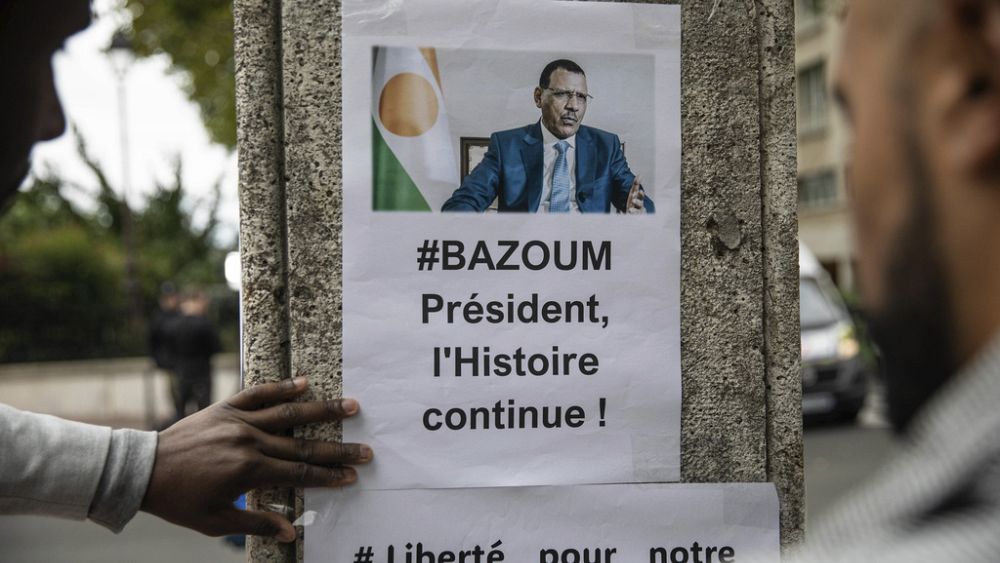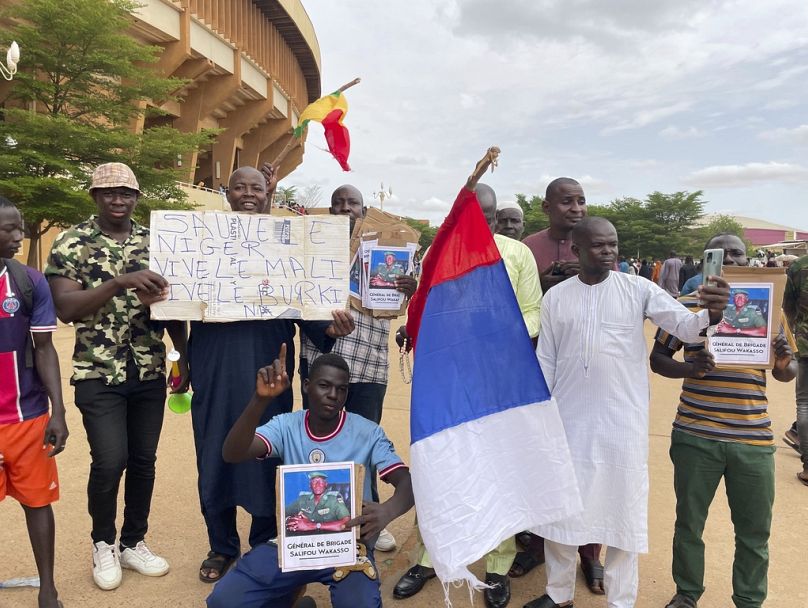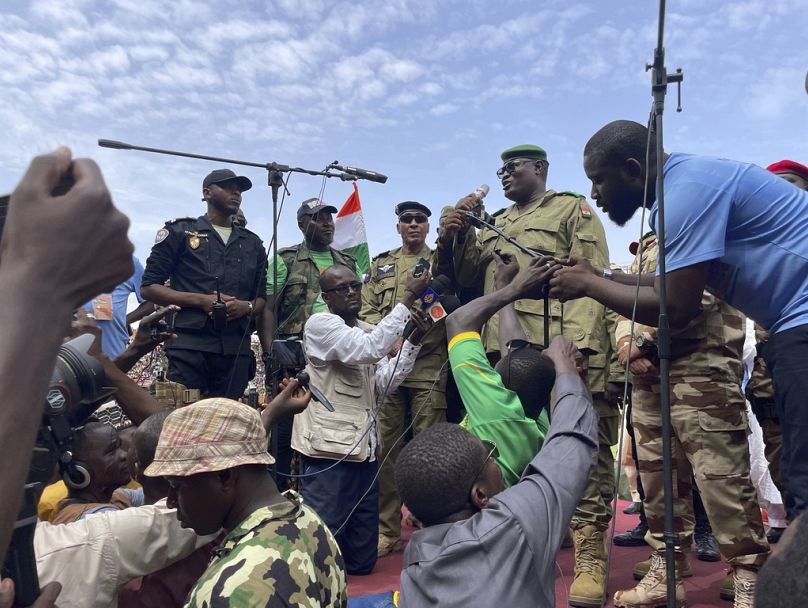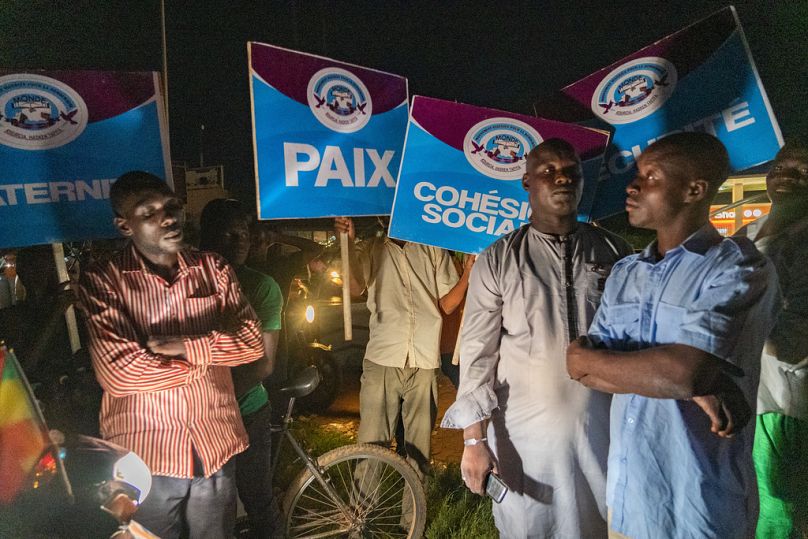
The US State Department expressed deep concern about the “deteriorating conditions” of his detention.
 ADVERTISEMENT
ADVERTISEMENTPresident Mohamed Bazoum, the West African nation’s democratically elected leader, has been held at the presidential palace in Niamey with his wife and son since mutinous soldiers moved against him on 26 July.
The family is living without electricity and only has rice and canned goods left to eat, the adviser said. Bazoum remains in good health for now and will never resign, according to the adviser, who wasn’t authorised to discuss the sensitive situation with the media and spoke on condition of anonymity.

Bazoum’s political party issued a statement confirming the president’s living conditions and said the family also was without running water.
US Secretary of State Antony Blinken spoke with Bazoum on Tuesday about recent diplomatic efforts, a statement said, and Blinken “emphasised that the safety and security of President Bazoum and his family are paramount.” The State Department statement on Wednesday called for their immediate release.
This week, Niger’s new military junta took steps to entrench itself in power and rejected international efforts to mediate. On Wednesday, it accused former colonizer France of trying to destabilise the country, violate its closed airspace and discredit the junta leaders. France’s foreign and defence ministries in a joint statement called the allegations unfounded.
On Monday, the junta named a new prime minister, civilian economist Ali Mahaman Lamine Zeine. He is a former economy and finance minister who left office after a previous coup in 2010 toppled the government at the time. Zeine later worked at the African Development Bank.
“The establishment of a government is significant and signals, at least to the population, that they have a plan in place, with support from across the government,” said Aneliese Bernard, a former State Department official who specialized in African affairs and is now director of Strategic Stabilization Advisors, a risk advisory group.
The junta also refused to admit meditation teams from the United Nations, the African Union, and the West African regional bloc ECOWAS, citing “evident reasons of security in this atmosphere of menace,” according to a letter seen by The Associated Press.
ECOWAS had threatened to use military force if the junta did not reinstate Bazoum by Sunday, a deadline that the junta ignored and which passed without action from ECOWAS. The bloc is expected to meet again on Thursday to discuss the situation.
It’s been exactly two weeks since soldiers first detained Bazoum and seized power, claiming they could do a better job at protecting the nation from jihadi violence. Groups linked to al-Qaida and the Islamic State group have ravaged the Sahel region, a vast expanse south of the Sahara Desert that includes part of Niger.
Most analysts and diplomats said the stated justification for the coup did not hold weight and the takeover resulted from a power struggle between the president and the head of his presidential guard, Gen. Abdourahmane Tchiani, who now says he runs the country.
 ADVERTISEMENT
ADVERTISEMENTThe coup comes as a blow to many countries in the West, which saw Niger as one of the last democratic partners in the region they could work with to beat back the extremist threat. It’s also an important supplier of uranium.
Niger’s partners have threatened to cut off hundreds of millions of dollars in military assistance if it does not return to constitutional rule.
While the crisis drags on, Niger’s 25 million people are bearing the brunt. It’s one of the poorest countries in the world, and many Nigeriens live hand to mouth and say they’re too focused on finding food for their families to pay much attention to the escalating crisis.

Harsh economic and travel sanctions imposed by ECOWAS since the coup have caused food prices to rise by up to five per cent, according to traders. Erkmann Tchibozo, a shop owner from neighbouring Benin who works in Niger’s capital, Niamey, said it’s been hard to get anything into the country to stock his shop near the airport.
If it continues like this, the situation is going to become very difficult, he said.
 ADVERTISEMENT
ADVERTISEMENTThe junta shut Niger’s airspace this week and temporarily suspended authorization for diplomatic flights from friendly and partner countries, according to the Ministry of Foreign Affairs.
Acting US Deputy Secretary of State Victoria Nuland met with the coup leaders but said they refused to allow her to meet Bazoum. She described the mutinous officers as unreceptive to her appeals to start negotiations and restore constitutional rule.
The United States has some 1,100 military personnel in the country and has seen Niger as a strategic and reliable partner in the region.
Still, Nuland made more headway than other delegations. A previous ECOWAS delegation was prevented from leaving the airport.

It’s unclear how much coordination is involved in the various mediation efforts. Some experts have worried that if the work is not coordinated, it could undermine ECOWAS.
 ADVERTISEMENT
ADVERTISEMENT“I think the US would come to a modus vivendi with this junta if the junta proved particularly amenable to U.S interests, but that doesn’t seem to be on the table for now,” said Alexander Thurston, an assistant professor of political science at the University of Cincinnati.
Analysts say the longer it takes to find a solution, the more time the junta has to dig in and the less momentum there will be to oust it. Other African nations are also divided on how to proceed.
Neighbouring Mali and Burkina Faso, both of which are run by military regimes, have sided with the junta and warned that intervention in Niger would be “tantamount to a declaration of war” against them. In a joint letter Tuesday to the UN, the two countries appealed for the organization to “prevent by all means at its disposal, armed action against a sovereign state.”
Mali and Burkina Faso also sent representatives to Niamey this week to discuss military options. Officials from all sides said the talks went well.





